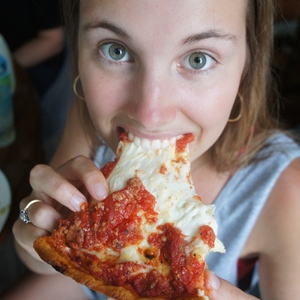“I’m just not going to eat anything today,” said one of the girls in the room with me. It was 11 am, and we were going to start pre-gaming for the football tailgate.
I stared at her in disbelief as she reached for the Fireball. An hour earlier, I ate a big bagel with peanut butter and banana, because I have been told since my first high school health class that you need to eat a good meal before drinking. It helps absorb alcohol and prevent hangovers.
Not only was I worried for her because she ignored one of the basic rules of safe drinking, I was also just shocked that she didn’t want anything to eat. I love breakfast. If I don’t eat breakfast, even something small, I feel light-headed and grouchy for the rest of the day.

We all went to the tailgate, had a great time, ate some Chipotle, and then passed out for three hours. Everyone woke up refreshed and ready to go out again.
Before we went out, I asked the other girls, “Aren’t we going to eat dinner first?”
“Nah, we’re not hungry,” they replied, ready to finish off the alcohol from earlier. Again, I sat in disbelief. Do they not eat?
Oh, no, I found out later. They do eat. When it’s 3 am and we’ve just come back from the party. Then, there is an endless supply of pizza, cheesy bread, and greasy Chinese food. As I sat alongside everyone, enjoying the delicious drunchies but entirely perplexed about why they choose to eat now, I realized that this scene embodied one of the biggest problems in American eating: the college diet.
What’s the Issue?

One of the biggest problems with the field of nutrition is that so many contradictory studies come out every year that it feels unclear what we should really be eating. Is gluten the enemy, or are whole grains okay in moderation? Is the vegetarian diet “better” for you than meat, or should we load up on turkey and chicken?
These uncertainties may cause some people to just say, “Screw it,” and eat whatever they want, but I don’t think it’s that simple. For example, we don’t need scientists to tell us that eating regular, well-portioned meals throughout the day is crucial to a healthy diet.
Take this common cycle:
You get really drunk at a party, and you come home to eat four slices of Domino’s with your roommates. The next day, you feel gross about what you did, so you vow to cut calories for the remainder of the day. You eat virtually nothing, and when you do it’s only “healthy,” things, like fruit and vegetables. Good job, right?
Nope. By the end of the day, you’re tired, weak and hungry. And you’ve been “good” all day, so there’s nothing wrong with eating all that leftover pizza, right? But how are you going to feel tomorrow morning? Rinse and repeat.

I truly care about nutrition. Obesity is one of the most dire problems in America. Many people think that lack of access to good education and healthy food markets in more impoverished areas is one of the leading causes of obesity.
That hypothesis makes a lot of logical sense, but I’m sure that all of those girls went through the same health classes that I did. So, why isn’t learning about nutrition enough to foster good eating habits?
Why Does This Happen?
The most immediate cause I can see is peer influence. We joke about the “College Diet” of late-night eats and cheap takeout, and it makes it seem okay. It’s self-perpetuating; we fall into the stereotype that years of young people living on their own has set up.

But with growing problems of body image and the need to “cut calories,” we try to offset our inevitable calorie bomb by eating virtually nothing during the day.
In reality, if we kept ourselves feeling full and happy throughout the day, maybe we wouldn’t want to stuff ourselves with food at 3 am. Maybe we would go to bed feeling happily full and wake up hungry enough to want breakfast.
It might not be clear whether the vegan diet, the paleo diet, or the butter diet is the best way to stay in shape and ensure lifelong heart health. I say: screw the diets. Eat what you logically know to be healthy, and what makes you feel good. And do it all day long. Don’t starve yourself so you can eat that chocolate cake after dinner. Fill yourself up with satisfying food, and let that chocolate cake be the cherry on top.
After all, a college education is supposed to set students up to be successful for the rest of their lives. But this college diet isn’t helping you prepare for a great future.


